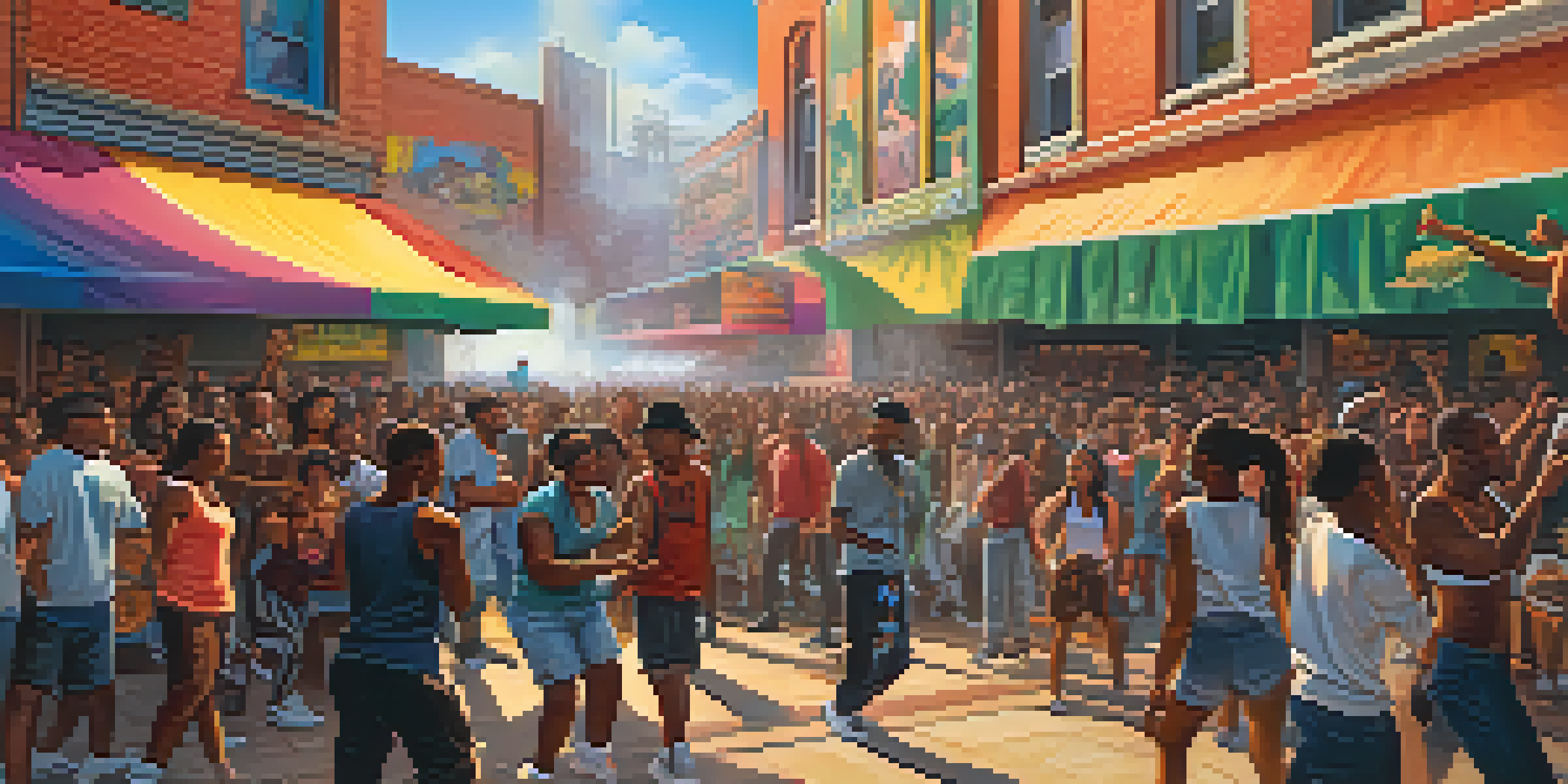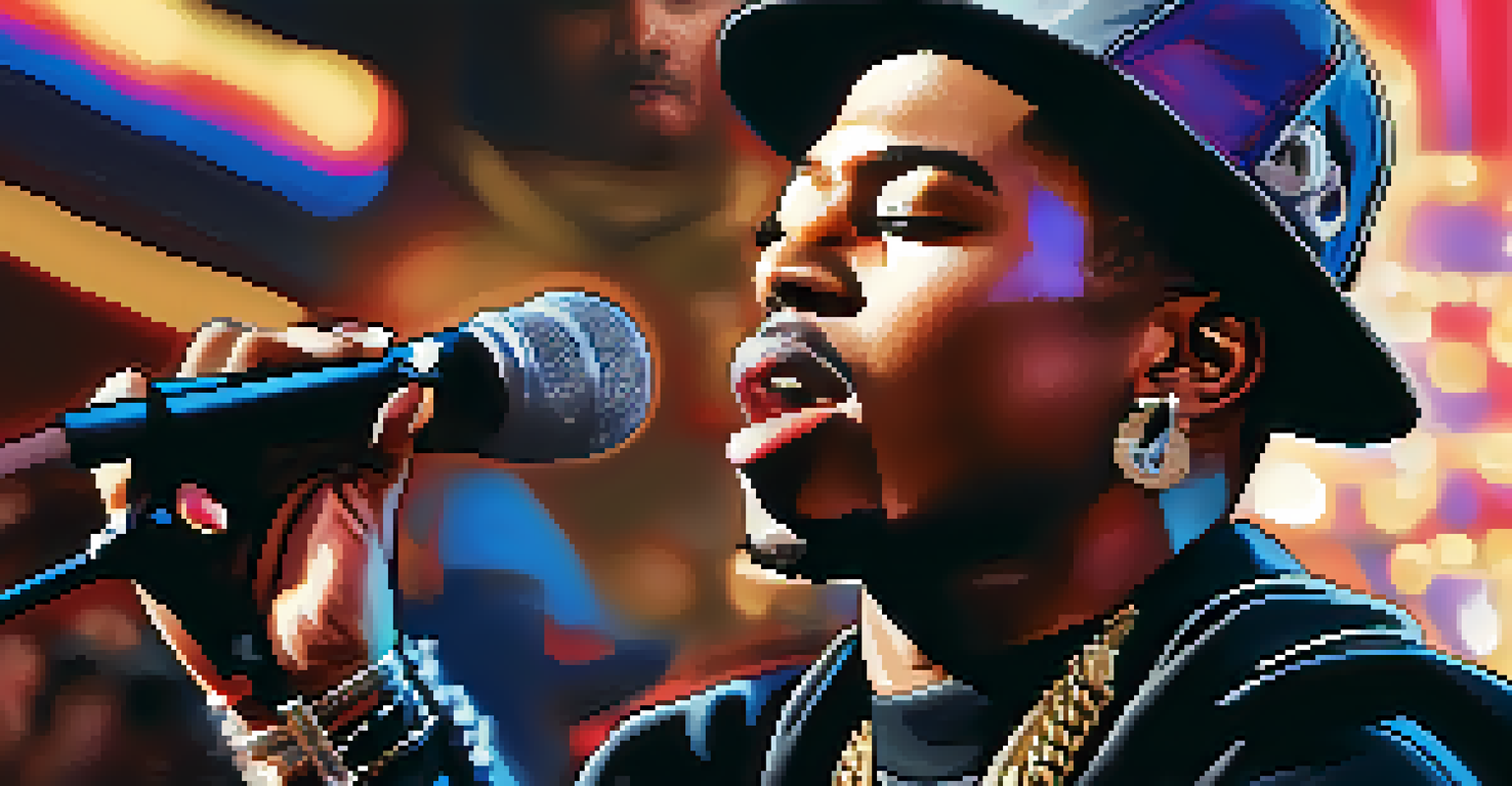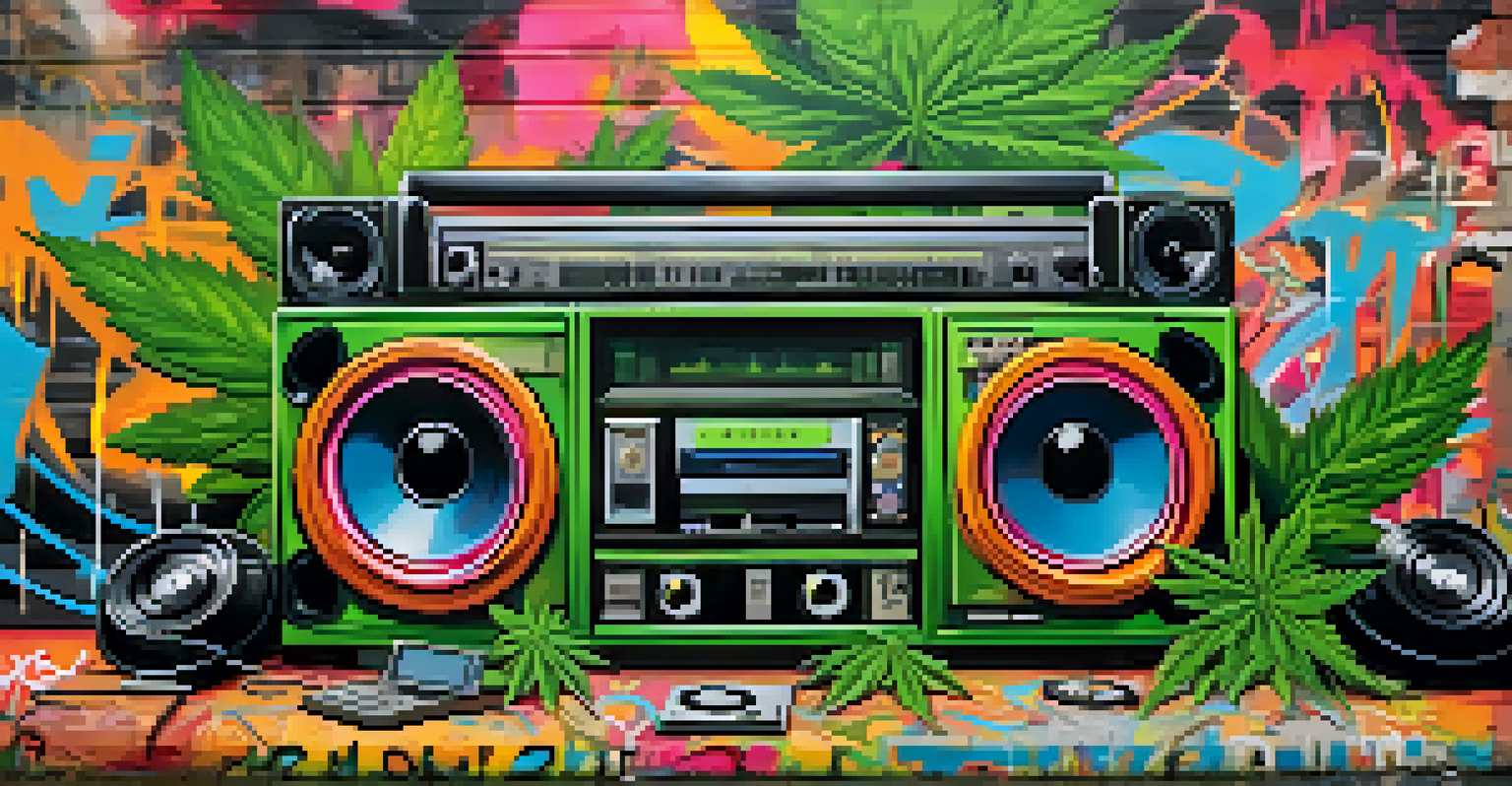The Influence of Hip-Hop on Cannabis Culture and Appropriation

Hip-Hop's Roots in Counterculture and Cannabis
Hip-hop emerged from marginalized communities in the 1970s, a response to social issues like poverty and discrimination. Within this vibrant culture, cannabis played a significant role as both a recreational substance and a symbol of rebellion. Artists often used cannabis to enhance creativity and connect with their audience, making it an intrinsic part of hip-hop's identity.
Hip-hop is a voice for the voiceless, and cannabis has always been a part of that narrative.
The fusion of hip-hop and cannabis culture can be seen in countless lyrics and music videos that celebrate marijuana use. This connection has helped normalize cannabis in popular culture, breaking down stigmas around its use. The portrayal of cannabis in hip-hop often reflects broader themes of freedom and self-expression, resonating with listeners who share similar experiences.
As hip-hop gained mainstream popularity, so did its association with cannabis. This relationship not only influenced the music industry but also affected cannabis branding and marketing. Today, cannabis brands often align themselves with hip-hop artists to tap into the cultural significance of the genre.
Influential Hip-Hop Artists and Cannabis Advocacy
Several hip-hop artists have become prominent advocates for cannabis legalization and social justice. Artists like Snoop Dogg and Wiz Khalifa have built their brands around cannabis, using their platforms to promote responsible use and push for reform. Their influence has played a crucial role in changing perceptions around cannabis, particularly among younger audiences.

Moreover, many artists share their personal stories about how cannabis has positively impacted their lives, whether through creativity, relaxation, or healing. These narratives foster a sense of community and acceptance, encouraging fans to embrace cannabis as part of their lifestyle. This advocacy also highlights the importance of responsible use and the need for a more equitable cannabis industry.
Hip-Hop's Roots in Rebellion
Hip-hop emerged as a response to social issues, with cannabis symbolizing creativity and rebellion within marginalized communities.
Through collaborations with cannabis brands and participation in legalization campaigns, these artists amplify the conversation around cannabis culture. Their contributions help to destigmatize cannabis use and promote awareness of the social injustices related to its prohibition, creating a more informed and conscious community.
The Role of Cannabis in Hip-Hop Lyrics and Imagery
Cannabis is a recurring theme in hip-hop lyrics, often used to convey messages of relaxation, rebellion, and freedom. Many artists employ vivid imagery that captures the essence of the cannabis experience, allowing listeners to connect emotionally with the music. This lyrical exploration reflects the broader cultural acceptance of cannabis within the hip-hop community.
The culture of hip-hop and cannabis is about freedom and self-expression; it’s about breaking down barriers.
For instance, tracks that celebrate cannabis often depict it as a source of inspiration, enhancing creativity and promoting a laid-back lifestyle. This portrayal has not only entertained audiences but also contributed to the normalization of cannabis in society. As a result, hip-hop has become a powerful vehicle for discussing cannabis culture and its associated values.
However, it's essential to recognize the nuances in these depictions, as they can also perpetuate stereotypes. While many artists celebrate cannabis, others may glamorize its use without addressing the potential risks. This duality in representation makes it crucial for artists to strike a balance between celebration and responsibility.
Cannabis Culture Events in Hip-Hop Communities
Cannabis culture has become increasingly intertwined with hip-hop events, from music festivals to cannabis expos. These gatherings celebrate both the music and the plant, providing a space for fans to enjoy live performances while embracing cannabis culture. Such events often feature collaborations with cannabis brands, creating a unique atmosphere where music and cannabis coexist.
For example, festivals like the 'Cannabis Cup' often include hip-hop performances, drawing fans from both communities. These occasions foster a sense of unity and shared passion, allowing attendees to engage with their favorite artists while celebrating cannabis culture. They also serve as platforms for promoting responsible cannabis use and educating attendees about the industry.
Artists Advocate for Cannabis Reform
Influential hip-hop artists like Snoop Dogg and Wiz Khalifa use their platforms to promote responsible cannabis use and push for legalization, fostering community acceptance.
As the cannabis market continues to grow, these events are likely to evolve, offering even more opportunities for hip-hop artists and cannabis brands to collaborate. This synergy not only enhances the experience for fans but also helps to further normalize cannabis use in society.
Commercialization and Appropriation of Cannabis Culture
As cannabis becomes more mainstream, commercialization has raised questions about cultural appropriation in hip-hop. Brands often leverage hip-hop imagery and language to market cannabis products, sometimes neglecting the cultural significance of the genre. This can create a disconnect between the original cultural context and the commercialized version that is presented to consumers.
For instance, products that use hip-hop aesthetics without acknowledging their roots can dilute the cultural significance of both hip-hop and cannabis. This appropriation can lead to feelings of exploitation among those within the community who feel their culture is being commodified. It's crucial to approach this commercialization with sensitivity and respect for the origins of both cannabis and hip-hop.
Artists and communities must advocate for authentic representation in the cannabis market. By collaborating with brands that honor the cultural significance of hip-hop, they can ensure that the narrative remains true to its roots while promoting responsible cannabis use.
Social Justice Movements and Cannabis Legalization
The intersection of hip-hop and cannabis culture has also played a pivotal role in social justice movements. Many artists have used their influence to advocate for the legalization of cannabis, linking it to broader issues of racial inequality and criminal justice reform. This activism highlights the disproportionate impact of cannabis prohibition on marginalized communities.
For example, high-profile artists have participated in campaigns aimed at changing cannabis laws and addressing the injustices faced by those imprisoned for non-violent cannabis offenses. By raising awareness about these issues, hip-hop artists help to mobilize their audiences, encouraging them to take action. This advocacy not only supports cannabis legalization but also promotes a more equitable society.
Cultural Significance vs. Commercialization
As cannabis becomes mainstream, there's a growing concern over cultural appropriation, highlighting the need for authentic representation in the cannabis market.
The ongoing dialogue within hip-hop about cannabis and social justice continues to evolve. As more states legalize cannabis, artists are increasingly focused on ensuring that the benefits of legalization are shared with those who have been most affected by its prohibition.
Looking Ahead: The Future of Hip-Hop and Cannabis Culture
As the cannabis industry continues to grow, the relationship between hip-hop and cannabis culture is likely to deepen. With more artists entering the cannabis space, we can expect to see innovative collaborations that reflect the evolving nature of both industries. This synergy has the potential to reshape perceptions around cannabis and create new opportunities for artists and entrepreneurs alike.
Moreover, as cannabis legalization spreads, the conversation surrounding responsible use and social equity will become increasingly important. Hip-hop artists will likely play a crucial role in advocating for these principles, ensuring that their communities benefit from the changing landscape. Their influence can shape not only how cannabis is viewed but also how it is consumed and marketed.

Ultimately, the future of hip-hop and cannabis culture will depend on how well artists navigate commercialization while remaining true to their roots. By prioritizing authenticity and social responsibility, they can ensure that the cultural significance of both hip-hop and cannabis endures for generations to come.